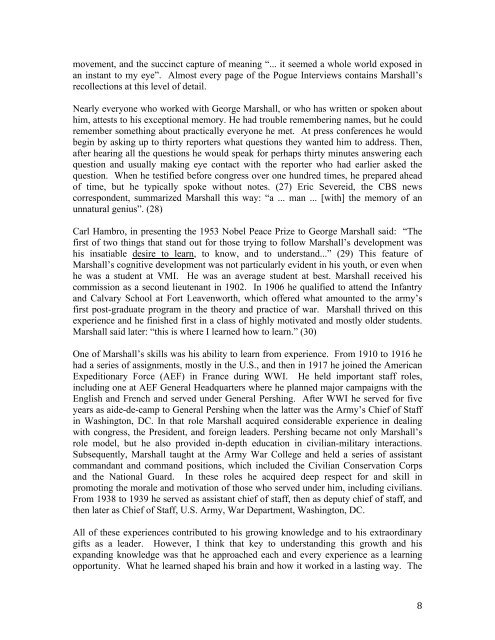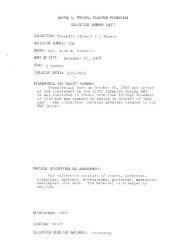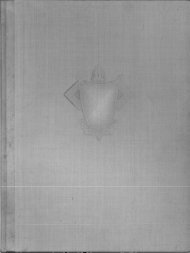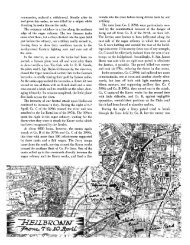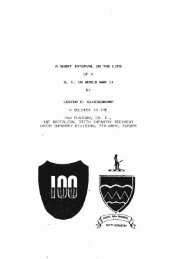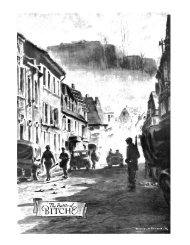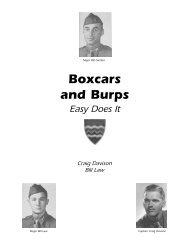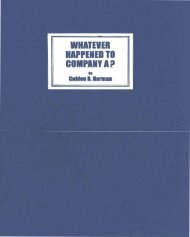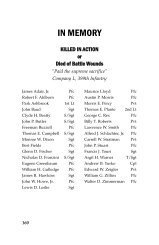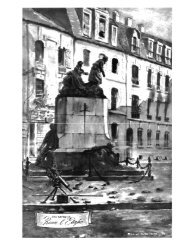General George Catlett Marshall - The George C. Marshall Foundation
General George Catlett Marshall - The George C. Marshall Foundation
General George Catlett Marshall - The George C. Marshall Foundation
Create successful ePaper yourself
Turn your PDF publications into a flip-book with our unique Google optimized e-Paper software.
movement, and the succinct capture of meaning “... it seemed a whole world exposed in<br />
an instant to my eye”. Almost every page of the Pogue Interviews contains <strong>Marshall</strong>’s<br />
recollections at this level of detail.<br />
Nearly everyone who worked with <strong>George</strong> <strong>Marshall</strong>, or who has written or spoken about<br />
him, attests to his exceptional memory. He had trouble remembering names, but he could<br />
remember something about practically everyone he met. At press conferences he would<br />
begin by asking up to thirty reporters what questions they wanted him to address. <strong>The</strong>n,<br />
after hearing all the questions he would speak for perhaps thirty minutes answering each<br />
question and usually making eye contact with the reporter who had earlier asked the<br />
question. When he testified before congress over one hundred times, he prepared ahead<br />
of time, but he typically spoke without notes. (27) Eric Severeid, the CBS news<br />
correspondent, summarized <strong>Marshall</strong> this way: “a ... man ... [with] the memory of an<br />
unnatural genius”. (28)<br />
Carl Hambro, in presenting the 1953 Nobel Peace Prize to <strong>George</strong> <strong>Marshall</strong> said: “<strong>The</strong><br />
first of two things that stand out for those trying to follow <strong>Marshall</strong>’s development was<br />
his insatiable desire to learn, to know, and to understand...” (29) This feature of<br />
<strong>Marshall</strong>’s cognitive development was not particularly evident in his youth, or even when<br />
he was a student at VMI. He was an average student at best. <strong>Marshall</strong> received his<br />
commission as a second lieutenant in 1902. In 1906 he qualified to attend the Infantry<br />
and Calvary School at Fort Leavenworth, which offered what amounted to the army’s<br />
first post-graduate program in the theory and practice of war. <strong>Marshall</strong> thrived on this<br />
experience and he finished first in a class of highly motivated and mostly older students.<br />
<strong>Marshall</strong> said later: “this is where I learned how to learn.” (30)<br />
One of <strong>Marshall</strong>’s skills was his ability to learn from experience. From 1910 to 1916 he<br />
had a series of assignments, mostly in the U.S., and then in 1917 he joined the American<br />
Expeditionary Force (AEF) in France during WWI. He held important staff roles,<br />
including one at AEF <strong>General</strong> Headquarters where he planned major campaigns with the<br />
English and French and served under <strong>General</strong> Pershing. After WWI he served for five<br />
years as aide-de-camp to <strong>General</strong> Pershing when the latter was the Army’s Chief of Staff<br />
in Washington, DC. In that role <strong>Marshall</strong> acquired considerable experience in dealing<br />
with congress, the President, and foreign leaders. Pershing became not only <strong>Marshall</strong>’s<br />
role model, but he also provided in-depth education in civilian-military interactions.<br />
Subsequently, <strong>Marshall</strong> taught at the Army War College and held a series of assistant<br />
commandant and command positions, which included the Civilian Conservation Corps<br />
and the National Guard. In these roles he acquired deep respect for and skill in<br />
promoting the morale and motivation of those who served under him, including civilians.<br />
From 1938 to 1939 he served as assistant chief of staff, then as deputy chief of staff, and<br />
then later as Chief of Staff, U.S. Army, War Department, Washington, DC.<br />
All of these experiences contributed to his growing knowledge and to his extraordinary<br />
gifts as a leader. However, I think that key to understanding this growth and his<br />
expanding knowledge was that he approached each and every experience as a learning<br />
opportunity. What he learned shaped his brain and how it worked in a lasting way. <strong>The</strong><br />
8


